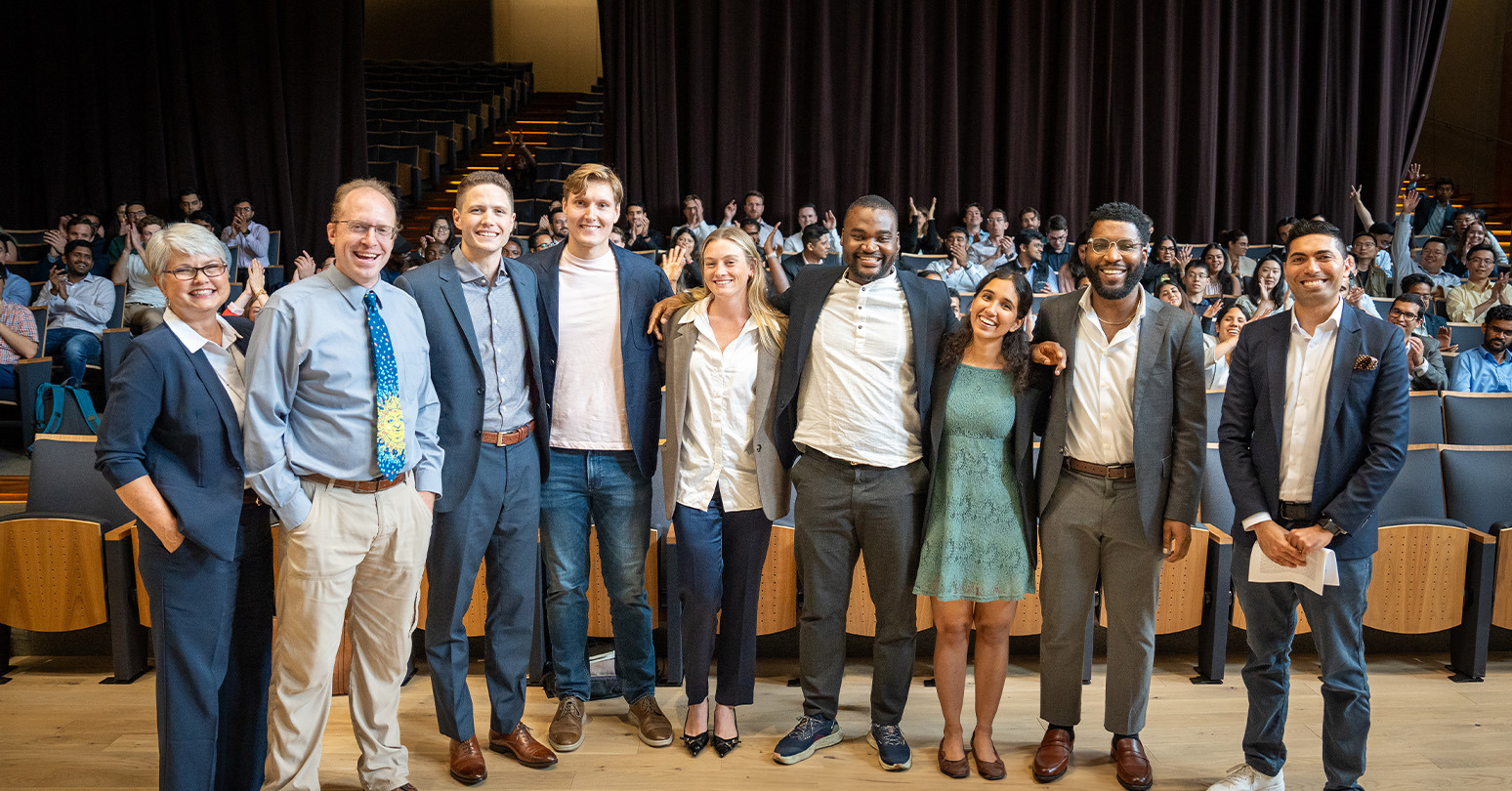Ivey’s MBA students were challenged to combine purpose with profits as they analyzed the potential impact and execution of an Alberta solar farm project for the 2024 Leading Critical Issues Case Competition.
The three-day event, August 26-28, focused on business opportunities in the emerging field of agrivoltaics, which involves growing crops underneath solar panels to generate agricultural production and energy simultaneously.
After learning about some agrivoltaics applications and a business venture from various guest speakers, the students tackled a case study on Valhalla, a solar farm project in Viking, Alberta. Working in teams, they had to evaluate whether or not to pursue the project and, if so, recommend how the project should be designed, considering financial, political, and social factors. After competing before faculty judges, four teams moved on to a final round, presenting their recommendations to a panel of faculty, alumni, and guest judges before a winner was declared.
Agrivoltaics: A promising new tool for sustainable food and energy production
Joshua Pearce, a professor in entrepreneurship and sustainability at Ivey and the John M. Thompson Chair in Information Technology and Innovation, introduced the event with an overview of agrivoltaics and how it addresses three critical issues: poverty, hunger, and zero-emissions energy.
Citing that 1.2 billion people in the world live on less than a dollar a day and nine million people die every day from hunger or hunger-related diseases, he said there’s an urgent need to reduce food production costs. At the same time, the world faces two significant energy problems: the need to reduce greenhouse gas emissions and lack of access to energy, compounded by a rapidly expanding population. Enter agrivoltaics, which has the power to address all of these issues as well as create business opportunities.
“We’re trying to think about how you as a business leader can move the world in the correct direction,” said Pearce. “Business has incredible power and that power can be used for good and evil, but hopefully, we are using it for good and looking at the problems in the world and thinking about how we can fix them while also making money.”
Focusing on business solutions that help the world
Ivey Dean Julian Birkinshaw,MBA ’91, PhD ’95, echoed that sentiment as he addressed the students at the event kick-off, noting how the challenge fits with Ivey’s purpose to inspire leaders for a sustainable and prosperous world.
“This is a great example of a critical issue and it’s one of these issues where there is no simple solution. It’s very clear that what we’re trying to do here is help you to figure out ways to be smart, commercial people – figure out ways to make money – but at the same time, trying to do the right thing for the world,” he said. “There’s no trade opportunity. We have to be sustainable and we have to be prosperous.”
The students also heard from two of Pearce’s colleagues from the Free Appropriate Sustainable Technology (FAST) research group; Uzair Jamil, Agrivoltaic Lead, and Nima Asgari, PhD Researcher; about the positive impact agrivoltaics is having on crop yields around the world – from tomatoes in Arizona to corn in Japan.
And guest speaker Patrick Gossage, Managing Partner of First Green Energy, told how he created a business centred on agrivoltaics. First Green Energy provides solar and agrivoltaics solutions for commercial, industrial, and residential use as well as advisory services. Gossage said he first launched a business in South Africa offering energy efficiency interventions after witnessing – while doing his MBA at University of Cape Town – how lengthy power outages disrupted businesses and impacted the economy. After moving back to Canada, he worked on a solar-powered greenhouse project in Beamsville, Ontario and said he was shocked to see how much faster basil plants grew under solar modules.
“I’m a huge fan of these win-win-wins, where you’re getting energy transition – where it’s renewable, clean energy, carbon-free from the sun – and you’re assisting farmers from an economic standpoint, improving their cash flow and allowing them to become better farmers and keep the family farm,” he said. “It’s part of this new wave of farming … and it’s improving food security.”
And the winners are
Congratulations to Team 17 for winning the 2024 Leading Critical Issues Case Competition! Team members included: Enare Agbor, Mohamed Feindouno, Aakriti Gupta, Milos Masnikosa, Keaton McMullen, and Heather Nichols.
Thank you to the judges
Presentation round:
- Joshua Foster, assistant professor of business, economics, and public policy;
- Fraser Johnson, HBA ’82, MBA ’92, PhD ’95; professor of operations management;
- Rob Klassen, MBA ’89, professor of operations management and sustainability and Associate Dean, Research;
- Kirk Kristofferson, assistant professor of marketing;
- Scott Loveland, MBA ’17, lecturer of operations management;
- Martha Maznevski, PhD ’94, professor of organizational behaviour;
- Mazi Raz, MBA ’05, PhD ’14, assistant professor of strategy;
- John White, lecturer in marketing and strategy; and,
- Yi (Zoe) Zou, assistant professor of information systems.
Finalist round:
- Farid Madhani, MBA ’17, Chief Financial Officer of Peak Power;
- Kim Parker, President and CEO of Food Security Structures Canada; and,
- Joshua Pearce, professor in entrepreneurship and sustainability at Ivey and the John M. Thompson Chair in Information Technology and Innovation at Western University’s Thompson Centre for Engineering Leadership & Innovation.
View more photos from the event








